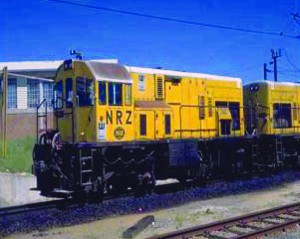Source: NRZ’s futile Chinese dalliances | The Financial Gazette September 28, 2017

At its peak, NRZ employed about 20 000 workers and moved 18 million tonnes of freight annually.
ZIMBABWE’S government has signalled it could cancel the $400 million tender for the recapitalisation of the ailing National Railways of Zimbabwe.
The contract, awarded to a consortium of non-resident Zimbabwean investors the Diaspora Infrastructure Development Group (DIDG) and South Africa’s Transnet, could be handed to a Chinese company if a group of ministers has its way. China has emerged as a major player in Zimbabwe’s capital-starved infrastructure sector, with projects stretching from power plant development, airport construction and water rehabilitation, at a time when international capital continues to shun the southern African country’s treacherous economic environment.
The DIDG-Transnet consortium, which ticks all the right boxes: significant involvement of Zimbabweans, demonstrable financial capacity and the technical expertise of a continental rail giant with an impressive network, seems to offer the NRZ the best chance of revival. The chronically-undercapitalised NRZ’s dalliances with Chinese entities, on the other hand, have failed to set the parastatal on a solid recovery track.
Seemingly averse to taking on full exposure to the NRZ, its Chinese suitors have typically offered partial solutions, where one firm would offer track rehabilitation, while another would be interested in rolling stock equipment. Apart from this, Chinese funding typically requires up to 15 percent as deposit, which neither the NRZ or its sole shareholder, government, could muster. This hindrance is best illustrated by a 2004 deal the NRZ agreed with China North Railway, which is now part of CRRC for the purchase of 14 mainline locomotives and 64 passenger coaches for $110 million.
The NRZ paid $2,9 million as part payment towards the required $11 million deposit but failed to pay the balance of the deposit, resulting in the contract being adjusted in 2010 for the purchase of 10 mainline locomotives, at a total cost of $29 million. The NRZ then converted the already paid $2,9 million as the deposit in this new arrangement. But the NRZ still failed to raise letters of credit for the purchase balance of $26,1 million for the manufacturing to commence.
To unlock the impasse, the contract had to be varied yet again to convert the deposit of $2,9 million to purchase 31 wagons which were commissioned in Bulawayo in November 2016, 12 years after the initial contract. Over the past two decades, the NRZ has made contact with nearly 20 Chinese companies, a rate of one per year, but has recorded a low success rate, with only eight resulting in formal agreements. Even after formalising the contact, there has been precious little actual take-off.
A total of eight Chinese companies expressed interest in the NRZ recapitalisation tender and participated in the pre-bid conference, but only two; SinoHydro Corporation and China Civil Engineering Construction Company (CCECC) eventually submitted their bids. However, the two firms submitted that they were not adequately prepared and sought an extension. Although Chinese funding comings with some significant advantages low interest rates of between two and three percent and lengthy grace periods of up to three years and loan tenures of about 15 years, they also come with conditions that have proved difficult not just for the NRZ but other Zimbabwean borrowers. Another common complaint is that proposed prices in Chinese contracts tend to be inflated and there are risks of contractors comNRZ’s futile Chinese dalliances promising quality to meet the set budget.
Details of some deals the NRZ has signed with Chinese firms:
China Northern Railway (CNR) (now CRRC)
The NRZ concluded supply contract for equipment (locomotives, coaches and commuter trains) with CNR in 2004. The NRZ paid $2,5 million in 2006 and an additional $400 000 in 2008 towards deposit for the equipment purchase price of $110 million, leaving a deposit balance of $8,5 million. After failing to secure lines of credit or guarantees, the NRZ and CNR revised the contracts in May 2010 to prioritise the supply of 14 locomotives for a $29 million for which the deposit paid was already adequate. The NRZ still failed to secure the lines of credit for the remainder of the purchase price. Eventually, the contract was adjusted to the supply of 31 new wagons instead. The deposit amount of $2,9 million already paid is equivalent to the price for the 31 wagons, which were delivered and commissioned on November 4 , 2016 in Bulawayo.
The Consortium
The consortium is a group comprising China International Fund (CFI), Sino-Zim Development Private Limited, CITIC Construction and China Railway Eryuan Engineering Corporation (CREEC) and the MOU was signed for Harare — Mutare rehabilitation during President Robert Mugabe’s August 2014 state visit to China. The consortium submitted a proposal, which NRZ has commented on. The consortium is yet to submit revised proposals.
China Habour Engineering Company (CHEC)
CHEC signed MOUs in July 2015 with NRZ for Lions’ Den Kafue link, Harare-Chitungwiza Commuter Rail and Rehabilitation of Track, Signalling and Telecommunications on four mainline corridors, as well as supply of wagons and 120T crane. The parties exchanged technical information. CHEC produced a preliminary technical beginning of February 2016 and the financial proposal has not yet been submitted to date.
China Railway Eryuan Engineering Group Co., Ltd (CREEC)
The NRZ signed an MoU with CREEC for railway network planning and rehabilitation of four corridors including supply of traction and rolling stock and other equipment in May 2015. CREEC has since undertaken a feasibility study on the Victoria Falls-Bulawayo-Harare corridor, including supply of locomotives, wagons and equipment, and produced a pre-feasibility report. In the report, CREEC initially estimated that the project would cost $750 million, and could be executed within three years. This figure was reduced to $324 million in subsequent negotiations through revising some of the unrealistic cost estimates and reducing the scope of the project.
COMMENTS